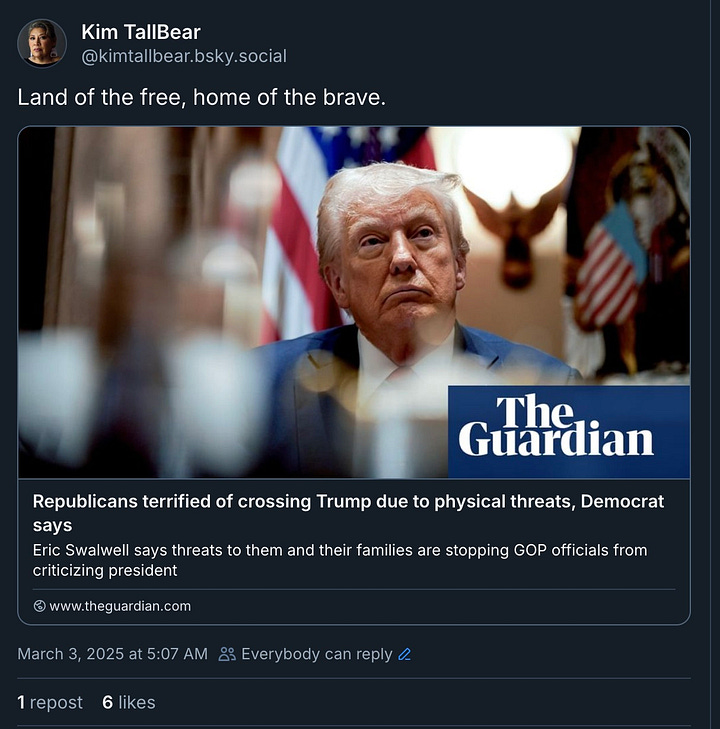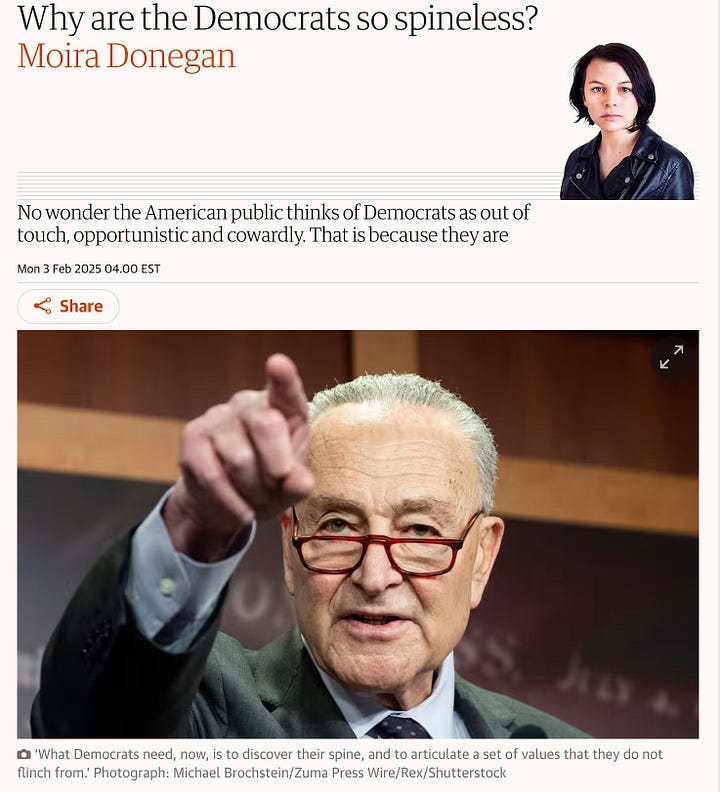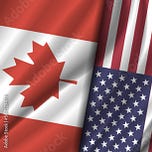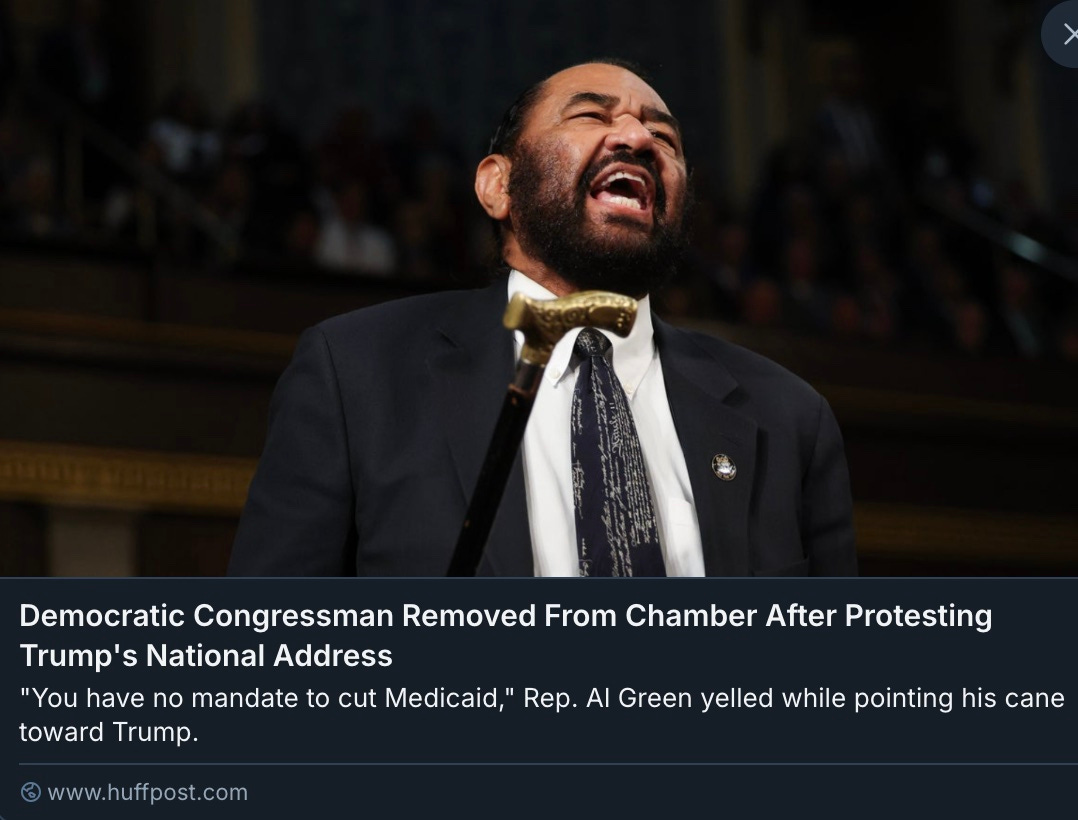I am a news junkie. Most days I wake up and immediately grab my phone and turn to a search engine newsfeed or to Bluesky. For example, many mornings I’ll post a half-dozen news articles, and probably read twice that many before getting out of bed. My mom and my late grandmothers who raised me were also news junkies. When I call my mom now, I often hear a 24-hour news channel in the background. She still works for one of our tribal government entities, always with the news on if she’s working from home. My great-grandmother religiously watched the noon, 6pm and 10pm news from her recliner, her arthritic knees kept warm under a crocheted blanket. In her humble little house on the South Dakota prairie, I would lie on my stomach each evening in front of her chair on the green shag carpeting, closer to the wood grain console TV, propped on my elbows, chin in my palms. I didn’t always understand the breaking news of the day, but knew who Walter Cronkite, Dan Rather, and Tom Brokaw were. And I remember my great-grandmother swearing at the TV especially when Ronald Reagan came on. “He’s too damn old to be president!” Reagan was four years younger than Granny.
My family were all Democrats. None of them had university degrees; most did working-class jobs. They were pro-Dakota sovereignty. My mother especially was avowedly anti-racist and anti-homophobic. My mom worked as an Indian Country campaign worker and advisor to multiple Democratic party candidates, including presidential candidates. She supported Reverend Jesse Jackson and his Rainbow Coalition. A loyal Democrat, she continued to work on the Michael Dukakis campaign when he, not Reverend Jackson, received the Democratic party nomination. Mom doesn’t have fond memories of working on the Dukakis campaign, but the scandal she relayed to me is her story to tell, not mine. I grew up going to Democratic Farm Labor (DFL) events in the Twin Cities when I moved there with my mom during my high school years. I remember a current events trivia game in my high school American history class that we would play every Friday. One Friday morning in spring semester of 1984, my teacher, Mr. Turner, asked us who were three Democratic candidates vying for the DFL nomination to run for the Senate seat from Minnesota that year. My hand shot up! I had just been to a debate with my mom a week or so earlier between Joan Growe, Wendell Anderson, and John Derus. Mr. Turner was impressed; my classmates if they were awake probably rolled their eyes.
Fast-forward three decades to 2015 and I defected from the Dems when I also emigrated to Canada to take a job as a Professor in the Faculty of Native Studies at the University of Alberta. My move that year coincided with the moment when, to put it plainly, I got sick of the Democrats being corporate sellout cowards. I was done with settler party politics. Moving to a country where I couldn’t yet vote gave me space to think about that. What I saw from US Democrats in 2015 and 2016 made it clear that their main highway was no route to protecting not only Dakota and other tribal people from ongoing theft and oppression, but it’s not a route for anyone but rich flag wavers. I suppose it makes some people feel better that rich and respectable Dems will wave a rainbow flag alongside the stars and stripes while they smile at you with their white teeth, mouthing their multicultural inclusive language, shouting at you to “vote blue no matter who,” to take the suffering on Earth while you wait for some bipartisan heavenly utopia in the afterlife. I consider it promising that it’s becoming obvious to more people the cowardice of rich Democrats (and Republicans) in this Trumpian-Muskian moment.


There are a few notable Democrats speaking candidly against Trump-Musk assaults, mostly people of colour and women. I am grateful to them as humans, not as Democrats.
I’ll issue a disclaimer here. Being a Dakota, I grew up in a non-evangelical tradition. Our society and culture is for us. We’re not trying to be a model for everyone else in a way that tries to make others be like us or else. I realize that is a challenging idea for settler state citizens, but I consider religious and political evangelism to be the height of settler arrogance. I am not evangelizing my position to you. I write and converse in order to find points of articulation, some common ground that permits us to work together for the wellbeing and for less suffering by humans and the planet. Alongside that project, you make your own decisions about religious or political party loyalism.
To return to my main point, by 2015 I was done with flag-waving of any kind. I’ve come to believe that blue or red, patriotism to the state ultimately betrays the people and the planet. I get the political strategy of voting, even in such a corporate-compromised electoral milieu such as ours. But humans can’t seem to resist going beyond strategy to over-identify with the settler political party, its signifying flags and colours, and then an over-identification with the settler state as an entity that can possibly be made to caretake all of the human relatives, and the lands upon which we depend. Settler nationalist flag waving in any political tone is ultimately anti-Indigenous; it’s built on ongoing Indigenous death and destruction co-constituted with environmental destruction. Every day I live with that reality. In so doing, I have to find ways to stand with the people and institutions who I can see are trying to do their part to lessen suffering and promote thriving. I try to focus on joining arms with such people where I can. I am quiet when they do their good while they also symbolically wave a national flag. I thank them as individuals, or as collectives of individuals. I will not thank a nation state. Less and less, do I understand human beings seamlessly identifying their actions with the state—turning the good they do into the property of Canada or the USA, thus turning with a magic wand Canada or the US into glittery magical pumpkin coaches to whisk us away to happiness-ever-after. Less and less do I understand great numbers of individuals needing to identify the power of our collective human and nonhuman capacities to sustain one another with jingoistic and garishly-coloured settler state flags. Those flags don’t keep us warm or feed us. They don’t love or care for us. They don’t keep our loved-ones safe. We do that for one another. Nation states waving flags create conditions of violence, deprivation, and cruel hierarchies then act like any reprieve from the cruelty is a sign of their inherent benevolence.
Moving to Canada to do Native or Indigenous Studies exposed me to more fundamental critique of the settler state than I had seen growing up in both reservation-based tribal community and in Minneapolis and St. Paul, which has a vibrant multi-tribal Native community. In the Twin Cities, many tribal people migrate between there, Anishinaabe reservations to the north, and Dakota reservations to the south and west. When I wasn’t living on the reservation with my grandmothers, I lived with my mother in that politically-active urban Native community where protests, political campaigns, and urban organizing were an everyday part of life.
I am fortunate to have grown up hearing from my extended family about Dakota history and the genocidal actions of white people against our ancestors in what became the State of Minnesota. It has been good for my mental health and moral compass that especially my mother made sure that I knew the USA, Minnesota and South Dakota had no ethical authority behind their colonialism, that their sovereignty is grounded in white supremacist lies and illegalities. This is why US Secretary of “Homeland” Security and former South Dakota governor Kristi Noem’s hateful nonsense surprises me not one bit.
My mother gave us intellectual and moral permission with her Dakota accounts of US history to not stand even as children for the US national anthem or say the Pledge of Allegiance in school. Yet, I didn’t hear anything growing up in Native community or in my earlier adulthood about future alternatives to the settler state or even the possibility of another avenue through which to work. Working critically within the most liberal or “progressive” corners of an inherently anti-Indigenous system and with the historical cards dealt to us was the message demonstrated to me by all of the activism and Native program building I saw in the 1970s and 80s. Maybe like Trump recently told Ukraine’s president Volodymyr Zelenskyy, we tribal people don’t have any cards, and we should just work with what is on offer. I know that’s what most US Americans and Canadians actually think. It’s just that it’s mostly conservatives like Trump and Noem who would say it out loud. Forgive me my Dakota standpoint if I think Trump and his minions are less of an aberration than most of you seem to think. For sure, they engage in less “civil” discourse with and about a wider range of humans.
Why did leaving the Dems coincide with my move to Canada? It’s not because Canada offered better settlers and an enlightened reprieve from the cynical, rich people-dominated domain of settler party politics. It was critical Indigenous people from lands currently called Canada who helped me broaden my critical vision related to settler nationalism and party politics. I accepted a Native Studies job in Alberta and moved to Canada for the chance to learn with Indigenous people here/there, to push my thinking further, and because I was growing weary and bitter from extreme Indigenous erasure in the US. In Canada, Indigenous people tend to be hypervisible, which makes for explicit rather than implicit racism. But it also means that Indigenous issues are more on the national radar in Canadian political conversations than they in US national conversations.
As for Indigenous people in Canada pushing my critical thinking, it’s not that they’re smarter than Native people where I’m from. In fact, one of the reasons I’ve been pretty comfortable in Alberta and in other prairie provinces in Canada is because my people have historically existed across those settler-imposed borders, and we have longstanding relations with other Indigenous peoples across the prairies to the north. I feel a cultural and social similarity. But I have a theory that it’s easier for Indigenous people to the north of the Canada-US border to imagine a world organized beyond the settler state. While we know the pain our ancestors suffered to birth the USA and which many of us continue to suffer, I don’t think as many US-based Natives have imagined a future without USA hegemony. Indigenous people in Canada don’t live inside a super power. That may help them imagine a future for their nations and for all of us where the Canadian settler state is not hegemonic. I hear them make critiques of the Canadian state that indicate that they see it as contestable, which does not mean they or I support Trump’s ubersettler inclinations to try and annex Canada or Greenland. Interestingly, in this moment of Trumpian aggression, even former Canadian Prime Minister Justin Trudeau recently speculated on the Canadian nation-state’s impermanence, and I quote Trudeau from a March 10, 2025 Associated Press article:
This is a nation-defining moment. Democracy is not a given. Freedom is not a given. Even Canada is not a given.
This current threat to Canadian and Greenlandic/Danish sovereignty is in part prompting my thinking about how I can stand with those globally who resist Trump-Musk tyranny while I also refuse to wave nation state flags, and by extension their political party banners. I do not stand with human relations north of the US-Canada border because Canada is my safe-haven. Even before Trump’s threats to annex, Canada was no safe escape from the USA. I live much of the year in Canada where I teach, but I still have a US passport. My child, partner, coparent, and my extended family all live south of the Canada-US border. I have no desire to abandon my familial and tribal territory. None of my family have citizenship or residency in Canada, which despite some USians’ threats to move north, Canadian status is not easy to get. Even if my family were able to move with me, Canada will feel the pain of US empire decline; the two states are economically sutured. Tearing apart that seam will be bloody. US empire decline and the ensuing global ramifications will hurt peoples and nations across the world. But US empire decline is a fact; it’s not going to be avoided, Trump or no Trump. As University of Wisconsin historian Alfred W. McCoy wrote in his 2017 book, In the Shadows of the American Century:
We are undoubtedly at the start of a major transition away from untrammeled US hegemony. If the National Intelligence Council is to be believed, then the American Century, proclaimed with such boundless optimism back in 1941, will be ending well before 2041. After a quarter century as the world’s sole superpower, Washington now faces an adversary with both the means and determination to mount a sustained challenge to its dominion. Even if Beijing falters, thanks to a decline in economic growth or a surge in popular discontent, there are still a dozen rising powers working to build a multipolar world beyond the grasp of any global hegemon…Whether by slow erosion or violent eruption, this ongoing shift in the balance of power bears watching. From everything I have learned over the past fifty years, we can count on one thing: this transition will be transformative, even traumatically so, impacting the lives of almost every American. (24)
Professor McCoy and the other expert I read on US empire decline, Peace and Conflict Studies founder, the late Johan Galtung, both predicted that multiple responses within the US are possible and will render a harder or a softer decline. Trump, however, (who Galtung considered a symptom and not cause of US decline) is drunk on power and driving us toward a hard crash into a brick wall of growing global resistance.
In closing: “Standing With and Speaking as Faith”
I’m with those like McCoy and Galtung who want a softer decline of US power, not only to reduce suffering of people in the US, but also globally. Years before the rise of Trump, Johan Galtung wrote in his 2009 book, The Fall of the US Empire - And Then What?:
The argument emerging from these pages is certainly that “western imperialism has had its time”… But a conclusion of that type leaves open a respectable range of action alternatives. To use language based on the organism analogy, if the patient is very, very old and quite ill, shall we prolong life artificially by inserting synthetic body pieces? Shall we let nature run her course and opt for a death in beauty? Shall we perhaps speed up the process through euthanasia? Or—shall we focus on the children, seeing to it that they become healthy, thriving, and strong, autonomous, neither flattering the big nor trampling on the small? Our personal inclination would be “death in beauty” and “focus on the children”…Neither unemployment/war in cyclical interchange as a response to economic crises nor the modern counterparts of internal market stimulation with leisurism would add up to more than artificial life prolongation. And to learn from history should mean not only to learn how to preserve something old but also how to give easier birth to something new. (186-87)
I wrote more on Galtung’s thought in my January 26, 2025 entry on this Substack, “Dakota Post from the Left Coast.” Now that I think about it, this post touches on similar ideas, but focuses on my predicament of standing with while also resisting relentless cycles and competitive narratives of settler nationalism signified by waving colonial flags. Unlike Galtung and McCoy, I do not possess prophetic or prognostic wisdom engendered of decades of geopolitical study. I have two planning degrees and I decided I didn’t want to be a planner. I’m more of an analyst and a critic. That said, I am committed to linking elbows with those who can articulate strategies, possibilities, and plans with critical analyses such as mine that focus on anti-colonial, pro Indigenous, pro-human, pro-planet moral sensibilities. I can’t tell you not to wave your flags, but I won’t free my hands for what I see as an ultimately misguided if strategic gesture in the shorter term. There is always a price to be paid for consolidating one’s desire to caretake relations with allegiance to a nation-state flag.
I’ll close with learning I gained doing community-based research with Indigenous people, especially scientists among them. It occurred to me in writing this post that those insights are actively informing my desire in this moment to think and work with non-Indigenous allies in our collective resistance to the tyranny of fascist oligarchs. I published in 2014 a by now much cited article, “Standing With and Speaking as Faith,” in the Journal of Research Practice. In that article, I explained how as an Indigenous person and researcher, I inhabit diverse Indigenous communities, including science communities. I explained how I engage in intellectual critique in good faith and not simply for critique’s sake. I critique with a shared cause, in order to help make our lives and (scientific) institutions better, less hierarchical, more democratic (3-4).
I find myself bringing insights from that 2014 article to thinking, working, and living with non-Indigenous collaborators in this time of transition and trauma. To recall some of the lines from “Standing With and Speaking as Faith,” I do not simply analyze cultural communities, but I inhabit them, local, global, and virtual. I am family, friend, and/or colleague to a stunningly diverse set of people in many parts of the world. I participate daily in their—our social lives and conversations. I care about making our individual lives and collective institutions better. I critique towards that end. I transfer my ethic of standing critically and generatively with other Indigenous people to my efforts now to inquire in concert with and share common cause with non-Indigenous people who will also resist fascist tyranny. I work to support development of our critical lenses that I believe can help us better care for all humans and for the planet. And I ask my human relations to consider that nation-state hegemony of any political persuasion inevitably requires subjugation and violently eliminating some of our relations. Can we all sit with the idea that the peoples and lands within which we dwell and which we care for are not synonymous with nation states?
As I write, New Democratic Party (NDP) Member of Parliament Charlie Angus for the Ontario riding of Timmins-James Bay posted the above photograph on Bluesky, a happy-looking scene of him on a train arm wrestling (apparently losing) with a young perhaps Indigenous girl. Angus has been hard at work rallying Canadians against Trump and USA aggression. By his sentiment in the post, “God I love this country,” I assume he refers to the nation-state of Canada. I also assume that he refers to loving those lands and caring for the well-being of its humans.
My point in this post is to validate sustaining care among us, and to propose not conflating our life-sustaining lands, waters, and human relations with “Canada,” and farther to the south with the “USA.” Our Indigenous “tribal” level organizations are implicitly or actively denigrated as chauvinistic or separatist; look at how the word “tribal” gets used as an epithet. But these settler-states are economic, political, and bureaucratic artifices that came fundamentally into being and continue through invasive violence and hierarchies of life. Like many religions, nation-state ideology promises eventual transcendence that will not be delivered. I wonder what kind of sustaining collectives and actions we will conceive of, and use more of our energies to build if we insist on keeping sight of present, factual differences, if we judge individuals and their institutions by what they try to do in the here and now upon the web of existence. Anthem singing, party sloganeering, and evangelizing nation-state utopic mythologies provide psychological sustenance for some, at a great cost to the many. I want to account for what is actually happening on the ground, to focus on the lands and the humans beneath those flags flapping in the wind.
Thank you as always for reading and/or listening.

















Share this post